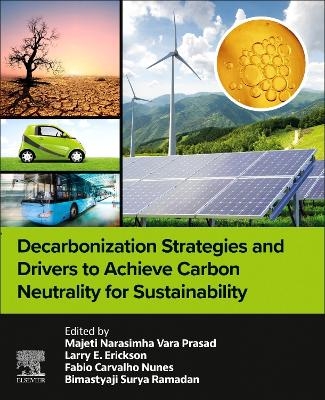
Decarbonization Strategies and Drivers to Achieve Carbon Neutrality for Sustainability
Elsevier - Health Sciences Division (Verlag)
978-0-443-13607-8 (ISBN)
Majeti Narasimha Vara Prasad is Emeritus Professor in the School of Life Sciences at the University of Hyderabad in India. He received his PhD in Botany from Lucknow University, Lucknow. In past he worked as Lecturer at North Eastern Hill University, Lecturer & Reader at University of Hyderabad. He is also serving as reviewer in many scientific journals. He is professional member of National Institute of Ecology New Delhi, India, Bioenergy Society of India, New Delhi, Indian Network for Soil Contamination Research, New Delhi. He also completed 20 research projects. He has published 179 articles in peer review journals in which contributed as author/co-author. He supervised 17 PhD and 7 M.Phil students, all students received award in his supervision. Larry E. Erickson received doctorate in 1964 in chemical engineering from Kansas State University. He has been a member of the chemical engineering faculty at K-State since 1964. In 1967-68 he conducted research in biochemical engineering at the University of Pennsylvania, and introduced courses in biochemical engineering and bioseparations at K-State. From 1985-2018, he has provided leadership for hazardous substance research at K-State. From 1989-2003, he was director of the Great Plains/Rocky Mountain Hazardous Substance Research Center, a consortium of universities with headquarters at K-State. In order to advance pollution prevention and improve environmental management, he introduced seminars in hazardous waste engineering, air quality, and sustainability. He has worked with more than 70 graduate students, coauthored more than 450 papers, traveled professionally to more than 25 countries, and participated in more than $50 million of funded research projects. In January 2015, he transitioned to emeritus professor of chemical engineering. He has been employed by Mobil Oil Company, ESSO Research and Engineering Co., Humble Oil and Refining Company. He has been a visiting faculty member at MIT, University of California, Berkeley, Institute of Biochemistry and Physiology of Microorganisms, Pushchino, Russia, and Institute of Microbiology, Prague, Czech Republic. Fabio C Nunes is Professor and Researcher, Federal Institute of Education, Science and Technology of Bahia (IF BAIANO). Environmental consultant job in licensing projects, impact assessment and environmental management. Geographer (2002), M.Sc. Geochemistry and Environment (2005), Ph.D. in Coastal and Sedimentary Geology from the Federal University of Bahia (2011). Develops scientific research with soils, soil-plant interactions, environmental impact assessment (EIA), recovery of degraded areas and education. Environmental Consultant since 2005 and 120 technical reports, Professor in the Faculty of Technology and Sciences - FTC (2006-2011), Professor since August 2011 in the Instituto Federal of Bahia (IF BAIANO), teaching for graduation Geography, Biological Sciences, and Post-graduation in Professional and Technological Education. Published 21 research articles in peer-reviewed Journals and 22 book chapters in Brazilian and international publishers, such as Elsevier and John Wiley & Sons. Bimastyaji Surya Ramadan is an assistant professor from Department of Environmental Engineering Department, Faculty of Engineering, Universitas Diponegoro, and a researcher in Environmental Sustainability Research Center (ENSI-RC) Universitas Diponegoro, Indonesia. He pursued M.Sc. in soil remediation in Institut Teknologi Bandung, Indonesia and Ph.D. in Environmental Systems in The University of Kitakyushu. Now, he works on the environmental systems and management, mostly in waste management and its impact to air pollution. He developed scientific measurements on open burning emission. He also studied about life cycle impact assessment (LCIA), dynamic system, and Geographical Information System (GIS) modelling for environmental system analysis. He published 17 research articles in international peer-reviewed journals and 3 book chapters in Wiley Online Library.
Section a) Strategies for Decarbonization 1. The contribution of Bioenergy to the decarbonization 2. Non-fossil energy targets for environmental sustainability 3. Role of Wind energy to the decarbonization 4. Hydrogen and Ammonia Energy for Decarbonization 5. Potential of Geothermal energy for decarbonization 6. Nuclear energy and its role in decarbonization 7. Si-based agrochemicals for mitigation of greenhouse gases 8. Reducing arable green-house gas emission for sustainability Section b) Role of Electrification in the Decarbonization 9. Electric vehicles for environmental sustainability 10. Internet of things [IoT] for charging of Electrical Vehicles Section c) Carbon capture, utilization and storage (CCUS) technologies 11. Carbon Dioxide Capture Technologies for the Conventional Energy Sector 12. Biological carbon sequestration for environmental sustainability 13. Policy Planning and Implementation for Carbon Capture Technologies 14. E-fuels: Pathway Towards Cleaner Future 15. CO2 Sequestration for Conventional Utilization and Industrial Application Section d) Waste to Energy 16. The Significant Role of Waste to Energy on Decarbonisation 17. Green energy from waste to promote decarbonization 18. Involvement of The Informal Plastic Recycler in Reducing Carbon Emission Section e) Case studies of Successful Energy Transition 19. Successful Energy Transition – Case study in Indonesia 20. Harnessing landfill gas (LFG) for electricity: A strategy to mitigate greenhouse gas (GHG) emissions in Jakarta (Indonesia) 21. Production of bioenergy from industrial crops for Decarbonization of environment 22. Agronomic management strategies for storing soil carbon and reducing greenhouse gas emission in the Mediterranean region 23. Agroforestry: a promising approach to reducing green-house gas emission 24. Nanomaterials and Novel Solvents for Carbon Capture Technologies 25. Landfill Gas as a source of energy to promote decarbonization 26. Waste to promote decarbonization 27. Decarbonizing Iron and Steel Sector in India
| Erscheinungsdatum | 16.03.2024 |
|---|---|
| Verlagsort | Philadelphia |
| Sprache | englisch |
| Maße | 191 x 235 mm |
| Gewicht | 1340 g |
| Themenwelt | Naturwissenschaften ► Biologie ► Ökologie / Naturschutz |
| Naturwissenschaften ► Physik / Astronomie ► Angewandte Physik | |
| Technik ► Elektrotechnik / Energietechnik | |
| Weitere Fachgebiete ► Land- / Forstwirtschaft / Fischerei | |
| ISBN-10 | 0-443-13607-6 / 0443136076 |
| ISBN-13 | 978-0-443-13607-8 / 9780443136078 |
| Zustand | Neuware |
| Informationen gemäß Produktsicherheitsverordnung (GPSR) | |
| Haben Sie eine Frage zum Produkt? |
aus dem Bereich


